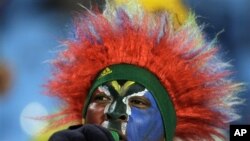Organizers of the football World Cup in South Africa have had to address a variety of challenges ranging from strikes and transportation problems to hooligans and ticket scalpers. But with more than one-third of the 64 matches played, they say they are pleased overall with how the tournament is progressing.
The head of the World Cup Organizing Committee, Danny Jordaan, has expressed satisfaction with the event noting that despite several problems no major incident has been recorded since kick-off one week ago.
South African police this week took over responsibility at the country's four largest stadiums after stewards went on strike over a pay dispute with the private contractor.
Jordaan noted that organizers responded quickly, deploying an additional 1,000 police officers at the sites, and the matches all started on time.
"You just have to look at whether or not you have a back-up or contingency plans for possible strikes for example," said Danny Jordaan. "That's a lesson we've learned long ago. You must have a plan B around these issues."
A threatened strike by workers at the state-owned electricity company was averted after a preliminary agreement was reached on workers demands.
Some of the early games began with a noticeable number of empty seats because fans were not able to get to the stadiums in time for kick-off.
Jordaan blamed this primarily on the large number of South Africans who prefer to drive their cars to games rather than take public transportation.
He said organizers are working with police to set up dedicated lanes for buses during the World Cup final and have launched a media campaign urging fans to take the bus or train to matches.
He said another lesson learned is that more tickets to matches should be sold over the counter and earlier in the process, a change that FIFA is likely to introduce for the next World Cup, in Brazil.
The threat of hooliganism to date has been avoided by rigorous police action.
Seventeen Argentine fans, who were known to be troublemakers, were deported Thursday after police raided their hostel in Pretoria.
Another 12 suspected hooligans, 11 from Argentina and one from England, were stopped at the airport and sent home before they could enter the country.
National Police Chief Bheki Cele told E-News Television said this was due to information sharing among foreign police agencies.
"We have worked with the agencies from these countries before now, so that they [hooligans] don't come into the country," said Bheki Cele. "But if there are any that will be there we have identified [them] and South African police, as we've always said, we are ready for any eventuality."
Police have also promised a crack-down on scalpers who sell match tickets at inflated prices, which is illegal. A Nigerian man was sentenced to three years in prison Thursday after he was discovered with 30 tickets near a stadium.
Jordaan said these challenges were typical for a large sporting event and they were being met.
He said local organizers were pleased with the World Cup so far, except for South Africa's loss Wednesday which effectively eliminated them from passing to the second round.
"It is a celebration and the party that we wanted it to be," he said. "So, it's a tournament of severe host-nation pain, but a celebration from an Organizing Committee perspective."
Officials have reminded disappointed South Africa fans that this tournament means a great deal more to the country than merely winning and are urging them to adopt other teams to support.
Many already have and South African fans can be seen at any game wearing the colors of one of the teams playing that day along with their own brightly colored scarves, wigs and hats.
News
Organizers Satisfied with World Cup Despite Challenges




